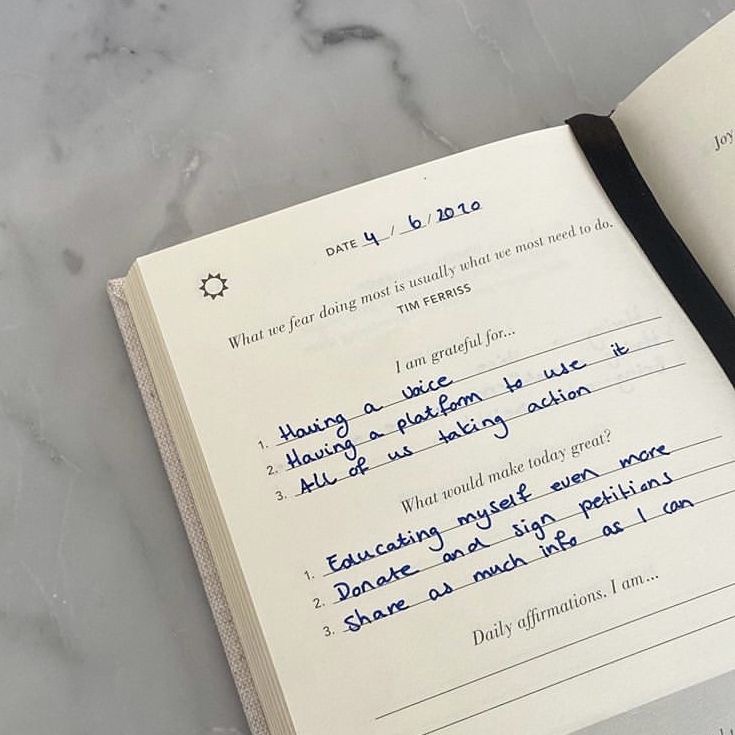Two years ago, I started a journey to discover myself, improve, and bring out the best in me. Like many people, I was inspired by self-help videos on TikTok. One thing that kept coming up was journaling, especially keeping a gratitude journal. So, with high hopes, I bought an overpriced notebook, and the next day it arrived. But then the real work began: writing every morning and night. But I was determined to stick with it, and I kept the journal next to my bed.
Every morning, the first thing I did was turn off my alarm and grab my pen. And wow—here I am, two years later, still committed to this ritual. Even though I don’t always feel like it, especially in the morning (my housemates can confirm I’m not a morning person), I keep going. Sometimes I skip it, like when I’ve been drinking, but I pick it up again the next day. I’ve bought the journal multiple times now, and I honestly recommend everyone to try it.
.
How does it work?
Every morning, I start with a nice quote, then write down three things I’m grateful for that day. Next, I write three things that would make my day amazing, and I finish with an affirmation. In the evening, I write down three things that went well during the day and one thing I learned. This whole process only takes a few minutes, but it has a huge impact on how I experience my day.
By doing this every day, I’ve noticed I’m much more positive. I’ve become more aware of how good my life is, and I feel like I’m glowing. Even on bad days, it helps me focus on what’s going right. It’s amazing how writing down just a few words can make such a big difference in how you feel.
The science behind gratitude
What also keeps me motivated is the fact that science backs up the benefits of keeping a gratitude journal. Studies show that practicing gratitude regularly can lead to improvements in both mental and physical health. Research has found that people who express gratitude often feel less stressed and anxious, and have an overall sense of well-being. It even helps improve sleep and reduce symptoms of depression (Dickens, 2017).
Gratitude also changes your brain. According to neuroscientists, practicing gratitude consistently can rewire the neural pathways in your brain, making you more likely to notice positive things in your life. This is because gratitude activates the part of the brain involved in positive emotions and reward, making you automatically more positive and less prone to negative thoughts (Kini et al., 2020).
Why I keep doing it
So, after two years, I’m still fully committed to my gratitude journal. It hasn’t only changed my mood and outlook on life, but it’s also helped me become more aware of the good things in my life. Sometimes it’s big things, like being grateful for my health or friends, but often it’s the little things: good weather, a great book, or a nice cup of coffee in the morning.
These small moments of gratitude help me start every day with a positive mindset. By taking a moment each morning & night to think about what I’m thankful for, I feel like I live my days with more intention. It’s helped me be more present and worry less about the future.
So, if you’re looking for a way to feel more positive and happier, I’d definitely recommend trying a gratitude journal. even if you’re not really into journaling or don’t feel like it’s something for you, why not give it a try? What’s the worst that could happen? t only takes a few minutes a day, but the effects can be huge. I can honestly say it’s changed my life—and might just change yours as well.
Ps this is the gratiyude journal that I got, but you could easily do it as well with a random notebook 🙂
Photo: https://pin.it/6qa4hdn3d
Dickens, L. R. (2017). Using Gratitude to Promote Positive Change: A Series of Meta-Analyses Investigating the Effectiveness of Gratitude Interventions. Basic and Applied Social Psychology, 39(4), 193–208. https://doi.org/10.1080/01973533.2017.1323638
Kini, P., Wong, J., McInnis, S., Gabana, N., & Brown, J. W. (2016). The effects of gratitude expression on neural activity. NeuroImage, 128, 1–10. https://doi.org/10.1016/j.neuroimage.2015.12.040


I really like the concept, I did it for various periods of my life, and it really makes you realise your true priorities and goals, which sometimes become confused if they just stay in your head. Personally, I find that using a different notebook compared to your planner (if you use a paper agenda) helps to be consistent, otherwise your to-do overlaps your gratitude part (which I often forgot about when in a rush) But its very personal some people like the convenience of having 2 in 1